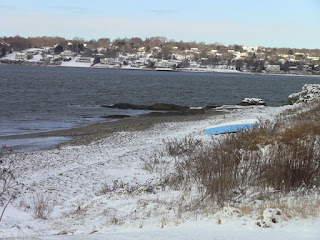Sitting in
the sand near the gently lapping surf on this sunny Sunday afternoon, it is
hard to imagine what it was like here five years ago when Tropical Storm Irene slammed
into our coastline.
Most of all,
I remember the sounds and the silence…
After
listening to the hurricane warnings, my husband and I had anchored our boat to
the summer house and secured all my parents’ belongings. They had been there
the day before, and my mother had left in tears.
Some of our
neighbors had boarded up their windows, and most of the residents had already
evacuated. When we drove away, we understood the very real possibility that
upon our return, everything might be gone: the summer house destroyed and our
yard underwater.
Back at our
Massachusetts’ home in the deep woods, we had other worries. Our house sits across the street from a pond
and is surrounded by 100-foot pine trees.
When we bought
our home, we were amazed that our house was wired to an ancient-looking
gasoline-powered generator that sat in the garage. But as soon as we moved in,
we realized that it was a necessity. We lost power in good weather, as well as
in bad, including once for five days after a snowstorm and after the onslaught
of Hurricanes Gloria and Bob.
But then the
electric company upgraded our area, and the generator sat unused in the corner
of the garage for more than a decade and atrophied, no longer able to generate
a spark.
When we
finally decided to invest in a new generator, we hired an electrician to bring
all the wiring up to code. And there it sat for two years, never tested, and we
wondered whether our money would have been better spent on other upgrades
around the house.
With the approach
of the hurricane, everything changed. The generator was a godsend. We wheeled
it out of the garage onto the driveway and filled it with gasoline.
My husband
and I awakened early that Sunday morning of the storm and went to the early
service. As the wind whistled around the country church and the rain splattered
the stained-glass windows, I read the words of the Prophet Jeremiah:
“I say to
myself, I will not mention Him, / I will speak his name no more. / But then it
becomes like fire burning in my heart, / imprisoned in my bones; / I grow weary
holding it in, I cannot endure it.”
Tropical
Storm Irene was barreling up our coastline. God help us.
Back at home,
we heard the sounds of the wind ripping through the woods, felling limbs and
tossing them everywhere. The power kept blinking on and off, but after a half
hour in the darkness, my husband pulled the cord on the generator and switched
the electrical box over to emergency power. The refrigerator started to hum and
the lights flickered.
It wasn’t
long before we learned that a tree had fallen on our next-door neighbor’s home.
A short way up the street, a massive tree had toppled taking with it all the
power, cable and telephone lines.
I called my
parents. The apple tree that had graced their front yard ever since they bought
the property in 1947 had just split in half.
As soon as
the tropical storm passed, my son drove to Fogland. Unbelievably, the summer
house had survived intact, and all the trees were still standing.
In the
evening we unplugged. The windows were open, and we heard sporadic gusts of
wind; but without the buzz of household appliances, it was eerily quiet. I lit three
candles and placed them around the room.
For my
birthday, my family had bought me a new e-reader. Long into the night, I read
the battery-powered Nook, the LED screen the only beacon of light in a world of
darkness.
As I drifted
off to sleep that night five years ago, I thought about how vulnerable we all
are. But I knew then, as I know now, that whenever we speak His name, we are
never alone. We always have back-up.





































